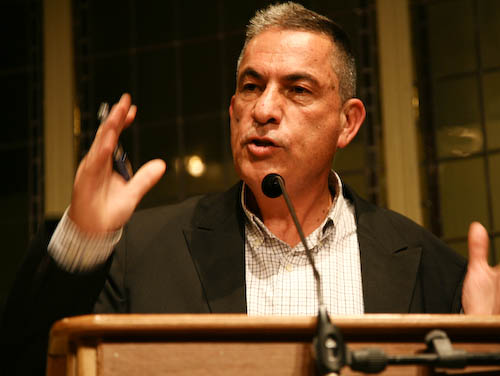
(Gideon Levy)
Het is tijd dat Israël en Palestina één staat worden, één staat voor twee volken. In feite is dat het al. Het wordt bewoond door meer dan twee volken, door joden en Arabieren, ultraorthodoxe joden, religieuze zionisten en seculiere joden, door joden uit het Midden-Oosten en uit Europa, door kolonisten en Palestijnen, scheef de Israëlische journalist Gideon Levy gisteren.
Alleen, déze staat wordt gekenmerkt door onrecht en ongelijkheid. En dat moet anders. Iedereen die er woont moet het recht hebben om te stemmen, en vertegenwoordigd te worden. Het zou een grondwet moeten hebben (Israël heeft nu geen grondwet, AM) die de rechten beschermt van alle gemeenschappen en minderheden – inclusief een immigratiebeleid zoals andere landen die ook hebben. (In Israël hebben alle joden recht op staatsburgerschap, maar voor niet-joden is daar bijna niet aan te komen, ook niet voor Palestijnen van wie de voorouders er al generaties woonden, AM)
Ja dat betekent het einde van de zionistische droom. Het betekent ook het einde van de droom van een Palestijnse staat. Dat zal voor veel Israëlische joden lijken op het eind van de wereld, het einde van waar ze al die tijd in geloofd en voor gevochten hebben, en die droom is niet eenvoudig op te geven, het doet pijn. Maar wat ervoor in de plaats zou komen is onvergelijkelijk veel beter en duurzamer – want rechtvaardiger. Lees Gideon Levy die wederom zijn nek uitsteekt.
Time to be single-minded
The end of the world? Why? Arabs and Jews already live together today, but discrimination, inequality, past tensions, racism, nationalism and mutual fear hinder relations between them.
If you will it, it is no dream: one just state for two peoples. The establishment of a Jewish State was perceived as something no less crazy less than 100 years ago. Subversive? The establishment of a Palestinian state was considered no less subversive even less than three decades ago.
One state for two peoples? It has already existed for a while now. More than two peoples live in it – Jews and Arabs; ultra-Orthodox Jews; religious Zionist and secular Jews; Jews of Middle-Eastern descent and Jews of European descent; settlers and Palestinians. Over time, the distance that separates these communities grows larger.
Somehow, they live together in one state, but one where justice and equality are absent. This, though, is how an imaginary, just state would appear: It would grant everyone the right to vote, and have a democratic constitution that would protect the rights of all communities and minorities – including an immigration policy like that of all other nations.
Such a state would have a legislature that would reflect the mosaic of the country, and an elected government formed by a coalition of the communities and the two peoples’ representatives. Yes, a Jewish prime minister with an Arab deputy, or vice versa.
The end of the world? Why? Arabs and Jews already live together today, but discrimination, inequality, past tensions, racism, nationalism and mutual fear hinder relations between them. These will gradually dissipate, and most of the dangers currently in store for the country will disappear with one state for two peoples.
At home, an egalitarian country like this would defuse most of the hatreds that bubble up from within. Arab citizens and Palestinians, with equal rights, will lose their subversive drive against the state that alienated them and dispossessed them of their rights. It will become their country. The Jews are likely to find that most of their fears were for naught: the moment that justice is established, the dangers – real and imagined – will be subdued.

Even more dramatic will be the disintegration of external threats. Iran, Syria, Hezbollah, Hamas and the rest of the “Axis of Evil” will lose the basis for their hatred. Who, then, will Iran threaten? A Jewish-Palestinian state? And who will Hezbollah and Hamas fire their missiles at? Against a Jewish-Palestinian consensus? Even the international stature of the new state will change in an instant: the world will excitedly embrace it and hurry to funnel large-scale aid to it.
This country will prosper when the massive budgets invested by both sides in preserving their own security will be redirected to other goals. Its fault lines will run, like in every other country, between the rich and poor, the educated and uneducated, the success stories and laggards. In the initial period, these successes will be the country’s Jews, who will prosper because their society is more developed, but the equality of opportunity can’t help but gradually bridge the gaps.
These imagined goals won’t be achieved in one day alone. The realization of this fantasy will be achieved through a long, difficult and complex process of liberation from old beliefs and values that were destructive for both nations. It will also require the overcoming of deep fears that are no less destructive, and drawing a line under the past.
The Jews will be forced to give up the dream of a national state, likewise the Palestinians. This will be the end of Zionism in its existing form, something very painful for those who have grown used to believing that it is the only way. But it will be replaced by something incomparably more just and sustainable.
The moment Israel’s Jews are persuaded that the Palestinians are humans like them, with everything this implies, the path will become a shorter one and become possible if a new leadership arises among the two peoples. Not a new politics of old and bad thinking, but truly revolutionary leadership that shatters old and bad paradigms and neutralizes fears.
At least two are required for this tango, and at present there isn’t even one. This dance will require a great deal of courage and imagination: right now, there is neither one nor the other. But think of the alternative – where does it lead? To another round in this bloody dance? And another round after that? But what about afterward? There aren’t many Israelis today who know how to answer which way the county is headed. To them, let it be said: If you wish a single, just state, it is no dream.
